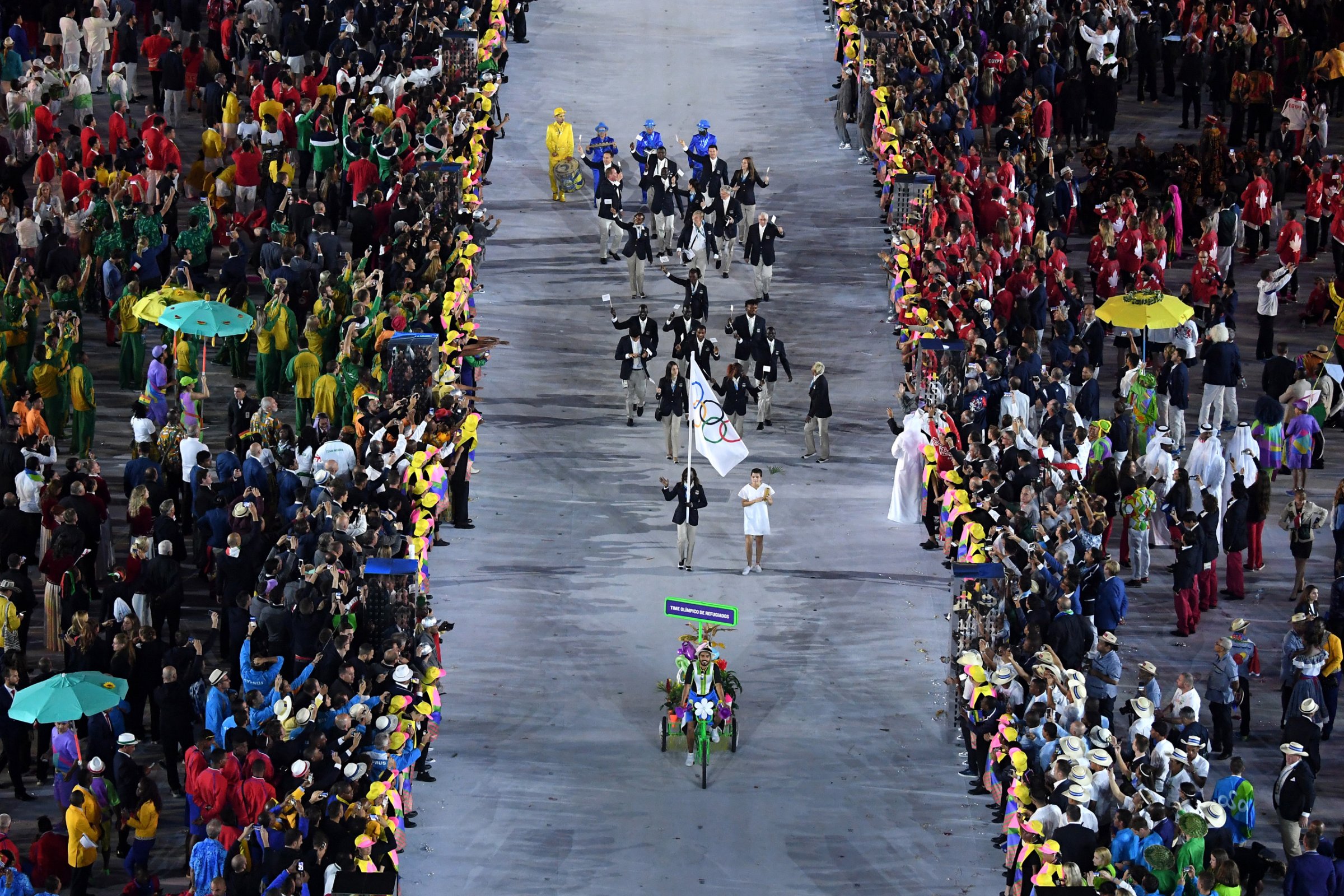
The Olympics are supposed to transcend politics, but some Games are more successful in that than others. These 5 facts explain why that is, and why Rio in particular stands out.
1. Munich 1972
Munich was billed as the “Happy Games,” a chance for democratic West Germany to reintroduce itself to the world. Security was purposely lax to dispel the image of a militarized Germany. It would be the last time security would play second-fiddle to appearances at an Olympics.
On the morning of Sept. 5, eight members of the Palestinian terrorist group Black September stormed the Olympic Village and took hostage almost a quarter of the Israeli delegation. The terrorists had hoped to secure the release of 234 Palestinian political prisoners, but Golda Meir refused on principle to negotiate. West German authorities then botched a rescue attempt, resulting in the death of six Israeli coaches, five Israeli athletes, and one West German police officer.
The specter of Munich still looms over the Games 44 years later; Rio has deployed a security force of 85,000 personnel. The U.S. isn’t taking any chances either; U.S. intelligence has dispatched more than 350 spies to Brazil to bolster Olympic security.
(The Guardian, TIME, The New York Times, NBC News)
2. Moscow 1980 & Los Angeles 1984
Munich showed how Games can be hijacked by individuals; Moscow and Los Angeles showed how Games can be hijacked by governments. In January 1980, Jimmy Carter warned that unless the Soviets withdrew troops from Afghanistan, the U.S. would boycott the Moscow Games. Not surprisingly, Moscow refused, and the U.S. eventually persuaded 61 other governments to join their boycott.
Also not surprisingly, the Soviets turned the tables with a boycott of the 1984 Los Angeles Games, but only succeeded in persuading 14 other countries to join them. Still, the damage had been done. The Olympics are supposed to transcend politics, not to be used as political bargaining chips. If Munich was a failure of preparation, the U.S.- and Soviet-led boycotts were a failure of the Olympic spirit at the highest levels.
3. Beijing 2008
When Beijing was awarded the Olympics in 2001, it had a GDP of $1.3 trillion; by 2008, its GDP had surged to $4.6 trillion. It made sense that a rising China would want to showcase its great success. It made less sense that a government with a history of human rights abuses would willingly put itself under the international microscope.
The early signs weren’t promising. For 21 countries and 85,000 miles, the Olympic torch relay turned into an obstacle course, beset by pro-Tibet and human rights protestors, as well as pro-China counter-protestors. Thousands showed up to demonstrate in London, Paris, San Francisco, Seoul and New Delhi, and things often got violent. But by the time the Olympic flame reached Beijing, politics had mainly fallen away as the world gathered to kick off the 29th Summer Olympic Games. To this day, the gold standard of opening ceremonies belongs to Beijing.
The success of these Games validated China’s ascension to the global stage, and China has been awarded the 2022 Winter Olympic Games. What better validation of success than that?
(The World Bank, The Washington Post)
4. Sochi 2014
Or the time Russia decided to make a Winter Olympics venue out of a summer resort town. Creating winter out of thin air came with quite a steep price tag: $50 billion. That’s more expensive than every previous edition of the Winter Games combined.
A big part of that price tag was a direct result of endemic corruption in Russia, which ranked 136th on a list of the least corrupt countries in the world in 2014. A single road connecting the Sochi coast to the Krasnaya Polyana ski resort cost $9.4 billion, more than the entire 2010 Vancouver Olympics. That’s $200 million per kilometer. Opposition leader Boris Nemtsov, later murdered in front of the Kremlin, would claim that nearly $30 billion dollars was lost to corruption and bribes.
(The Wall Street Journal, Transparency International)
5. Rio de Janeiro 2016
Like China, Brazil had hoped to make these Olympics a statement. Unfortunately, a faltering economy, the ongoing corruption probe involving state oil giant Petrobras, and the accompanying impeachment proceedings against President Dilma Rousseff have made that all but impossible.
Cutting through this domestic political chaos, however, Rio hosted the first-ever Refugee Olympic Team. Some 65.3 million people—one of every 113 individuals around the world—are currently displaced, according to the U.N. If displaced persons were a country, they’d match the population of the U.K. Ten refugee athletes were selected for the team, representing four war-torn countries: Syria, South Sudan, Ethiopia, and the Democratic Republic of Congo. And while the Refugee team hasn’t yet won any medals, they’ve provided the Rio Games with its most transcendent moment. Upon entering Rio’s Maracanã Stadium to march in the Parade of Nations, the Refugee team received a raucous standing ovation from tens of thousands of spectators. If there’s a moment that truly embodies the Olympic spirit, that’s it.
Every couple of years the world gathers to compete at the Olympics; more importantly, the world’s great athletes, and fans from nearly every nation, gather to meet one another. Everyone knows the Games are susceptible to corruption, cost lots of money, and leave infrastructure of questionable long-term value in their wake. But in an era of nationalism and rising xenophobia around the world, we all need to be reminded that the Olympic spirit is real—and a powerful thing.
In that, Rio has been a memorable success.
More Must-Reads from TIME
- Donald Trump Is TIME's 2024 Person of the Year
- TIME’s Top 10 Photos of 2024
- Why Gen Z Is Drinking Less
- The Best Movies About Cooking
- Why Is Anxiety Worse at Night?
- A Head-to-Toe Guide to Treating Dry Skin
- Why Street Cats Are Taking Over Urban Neighborhoods
- Column: Jimmy Carter’s Global Legacy Was Moral Clarity
Contact us at letters@time.com